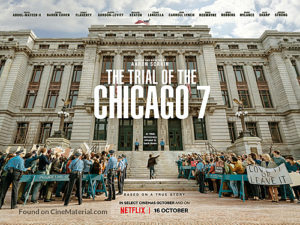 By Steve Crum
By Steve Crum
That cliché of history continuing to repeat itself lives on in writer/director Aaron Sorkin’s eventful historical legal drama, The Trial of the Chicago 7. That is because elements of 1969 and ’70 are so akin to today’s disruptive times. Sorkin (The West Wing, A Few Good Men) has written an absorbing account of what many call a “show trial” that lasted several months.
The U. S. Federal Court charged seven antiwar activists for inciting a riot at the 1968 Democratic Convention in Chicago. Actually, eight were originally charged until Bobby Seale successfully had his trial separated from the others. Simple 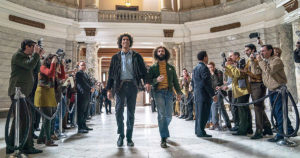 math renamed the defendants “The Chicago 7.” While the outcome of the trial resulted in acquittals for conspiracy, Judge Julius Hoffman’s contempt of court charges against all on trial racked up hefty sentencing. Not to give away too much, his charges were later reversed. So much for your American history lesson.
math renamed the defendants “The Chicago 7.” While the outcome of the trial resulted in acquittals for conspiracy, Judge Julius Hoffman’s contempt of court charges against all on trial racked up hefty sentencing. Not to give away too much, his charges were later reversed. So much for your American history lesson.
Kudos for Sorkin and particularly editor Alan Baumgarten for compressing the preceding into 130 minutes of crackling dialogue and courtroom drama that is both tense and shockingly funny. We have the defendants: Abbie Hoffman (played by Sacha Baron Cohen), Jerry Rubin (Jeremy Strong), David Dellinger (John Carroll Lynch), Tom Hayden (Eddie Redmayne), Rennie Davis (Alex Sharp), John Froines
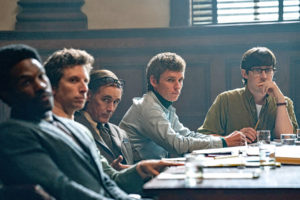 (Daniel Flaherty), Lee Weiner (Noah Robbins), and Bobby Seale (Yahya Abdul-Mateen II). From the get-go, Seale wants to be separated from the others since his actions in Chicago were totally apart from the others.
(Daniel Flaherty), Lee Weiner (Noah Robbins), and Bobby Seale (Yahya Abdul-Mateen II). From the get-go, Seale wants to be separated from the others since his actions in Chicago were totally apart from the others.
Representing the government is prosecutor Richard Schultz, portrayed by Joseph Gordon-Levitt.
Obviously representing the government as well is the anything-but-impartial Judge Julius Hoffman (Frank Langella). Langella’s wild and crazy judge dominates courtroom sequences. Note that there are numerous flashbacks that illustrate defendants’ testimony, covering plans for their protests to what occurred during the protests. Interspersed is actual footage from 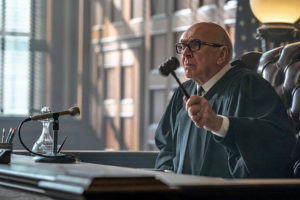 the Chicago riots.
the Chicago riots.
The trial itself becomes a mini-riot of sorts—with a wacko judge who continuously mispronounces everyone’s names and demands order. He overrules the defendants so much that at one point he yells, “overruled,” before anyone has ruled.
Contrast him with Bobby Seale, who disrupts court so often with screaming at the judge that he is gagged and shackled. Then you get the Abbie Hoffman/Jerry Rubin stunts such as wearing robes in court as “homage to the judge.” Remember that this trial went on for months.
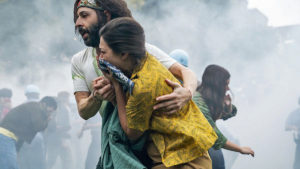 There are also fascinating sequences of the defendants talking out strategy in the backroom during breaks. Incidentally, their counsel, William Kunsler, is impressively played by Mark Rylance. And do not overlook the fine cameo by Michael Keaton as Ramsey Clark.
There are also fascinating sequences of the defendants talking out strategy in the backroom during breaks. Incidentally, their counsel, William Kunsler, is impressively played by Mark Rylance. And do not overlook the fine cameo by Michael Keaton as Ramsey Clark.
Quoting Aaron Sorkin in Entertainment Weekly: “Protests got demonized as being un-American, Marxist, communist—all things they called the Chicago 7. Watching recent coverage of protesters clashing with police, all you had to do was degrade the color a bit and it would look exactly like the footage from 1968. The movie is not intended to be a history lesson, or about 1968—it’s about today.”
The Trial of the Chicago 7 is must-see.
∞∞∞∞∞
GRADE on an A-F Scale: A
